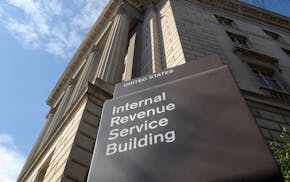Nearly 200,000 Minnesotans have one thing in common right now: They've lost their jobs and, in many cases, their health insurance.
These historic unemployment numbers are just one symptom of the current economic crisis facing our state and nation. Families are losing their homes, bankruptcies are on the rise, and a lack of health insurance exacerbates both. When the Legislature undertakes its staggering task this year of balancing the state budget, we must do so with an eye to easing the pain job loss wreaks on our communities and families. We can start with short-term, affordable health insurance.
Most of us can identify with the toll on families when they don't have insurance. Cost-effective, preventive care is often delayed or skipped altogether; visits for injury or illness may be put off until more costly emergency care or hospitalization is required. A lack of health insurance may even compound the challenge of finding a new job when chronic conditions go untreated.
In addition, there is a broader economic impact as fewer people seek care. More than one in eight Minnesotans work in the health care industry. As people put off routine care and delay treatment for more serious ailments, local clinics and hospitals suffer. We have already seen major health-care layoffs in recent months. We cannot afford to let rising unemployment and the subsequent loss of health insurance further weaken one of our state's largest economic engines.
The one option that is currently available to laid-off workers, Continuation of Health Coverage, otherwise known as COBRA, is too expensive for most families. Qualified individuals are required to pay 102 percent of both the employer's and employee's share of the cost of the policy. The cost of COBRA premiums is more than $1,000 per month on average for family coverage, simply unaffordable when unemployment benefits average about $324 a week. As a result of this high cost, only 20 percent of those individuals who qualify for COBRA actually buy it, leaving 80 percent of the newly unemployed uninsured. That is unacceptable.
What can we do? One immediate option is to offer MinnesotaCare — the state's health-care plan for working Minnesotans — to those who are approved for unemployment benefits. People would remain covered as long as they continue to receive unemployment benefits and pay the low-cost premiums.
This unique program could sunset in two years, after the current economic crisis has passed. Using the MinnesotaCare fund, which currently has a surplus balance of dedicated health-care dollars, to help Minnesotans in this time of economic crisis is the right thing to do, will help Minnesotans get back to work even faster, and offers additional stimulus to our economy.
Admittedly, this is a short-term solution. We must continue to move forward on more fundamental, broad-ranging reform of our health-care system. But right now there is a need for immediate relief. The Legislature can and should deliver it.
Paul Thissen, DFL-Minneapolis, is a member of the Minnesota House and a candidate for governor.
Readers Write: Politicized education, presidential debates, election strategies, small-town papers

Taxes increasingly paying for the past — not the future
!["Since the [Hennepin Healthcare System] Board took control in 2007, CEO pay increased by more than 142%. Meanwhile, that same board sunsetted employee](https://arc.stimg.co/startribunemedia/J7MD7DSJWMP3KYIYUSCQTABOAA.jpg?h=91&w=145&fit=crop&bg=999&crop=faces)

